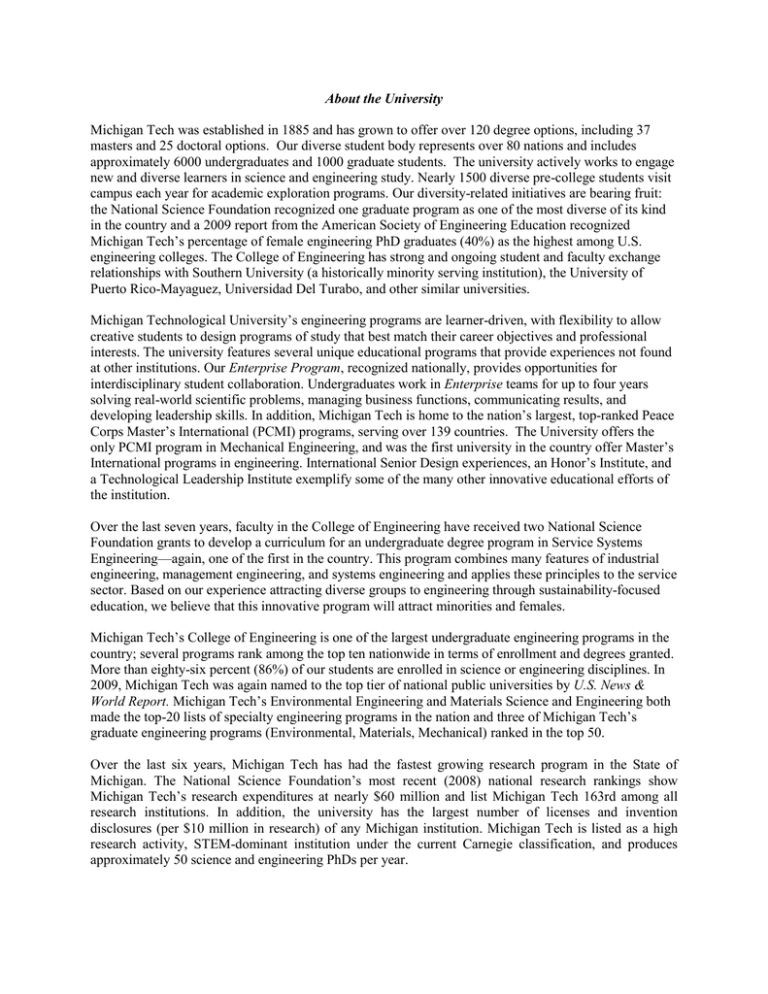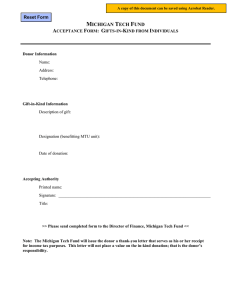About the University
advertisement

About the University Michigan Tech was established in 1885 and has grown to offer over 120 degree options, including 37 masters and 25 doctoral options. Our diverse student body represents over 80 nations and includes approximately 6000 undergraduates and 1000 graduate students. The university actively works to engage new and diverse learners in science and engineering study. Nearly 1500 diverse pre-college students visit campus each year for academic exploration programs. Our diversity-related initiatives are bearing fruit: the National Science Foundation recognized one graduate program as one of the most diverse of its kind in the country and a 2009 report from the American Society of Engineering Education recognized Michigan Tech’s percentage of female engineering PhD graduates (40%) as the highest among U.S. engineering colleges. The College of Engineering has strong and ongoing student and faculty exchange relationships with Southern University (a historically minority serving institution), the University of Puerto Rico-Mayaguez, Universidad Del Turabo, and other similar universities. Michigan Technological University’s engineering programs are learner-driven, with flexibility to allow creative students to design programs of study that best match their career objectives and professional interests. The university features several unique educational programs that provide experiences not found at other institutions. Our Enterprise Program, recognized nationally, provides opportunities for interdisciplinary student collaboration. Undergraduates work in Enterprise teams for up to four years solving real-world scientific problems, managing business functions, communicating results, and developing leadership skills. In addition, Michigan Tech is home to the nation’s largest, top-ranked Peace Corps Master’s International (PCMI) programs, serving over 139 countries. The University offers the only PCMI program in Mechanical Engineering, and was the first university in the country offer Master’s International programs in engineering. International Senior Design experiences, an Honor’s Institute, and a Technological Leadership Institute exemplify some of the many other innovative educational efforts of the institution. Over the last seven years, faculty in the College of Engineering have received two National Science Foundation grants to develop a curriculum for an undergraduate degree program in Service Systems Engineering—again, one of the first in the country. This program combines many features of industrial engineering, management engineering, and systems engineering and applies these principles to the service sector. Based on our experience attracting diverse groups to engineering through sustainability-focused education, we believe that this innovative program will attract minorities and females. Michigan Tech’s College of Engineering is one of the largest undergraduate engineering programs in the country; several programs rank among the top ten nationwide in terms of enrollment and degrees granted. More than eighty-six percent (86%) of our students are enrolled in science or engineering disciplines. In 2009, Michigan Tech was again named to the top tier of national public universities by U.S. News & World Report. Michigan Tech’s Environmental Engineering and Materials Science and Engineering both made the top-20 lists of specialty engineering programs in the nation and three of Michigan Tech’s graduate engineering programs (Environmental, Materials, Mechanical) ranked in the top 50. Over the last six years, Michigan Tech has had the fastest growing research program in the State of Michigan. The National Science Foundation’s most recent (2008) national research rankings show Michigan Tech’s research expenditures at nearly $60 million and list Michigan Tech 163rd among all research institutions. In addition, the university has the largest number of licenses and invention disclosures (per $10 million in research) of any Michigan institution. Michigan Tech is listed as a high research activity, STEM-dominant institution under the current Carnegie classification, and produces approximately 50 science and engineering PhDs per year.

